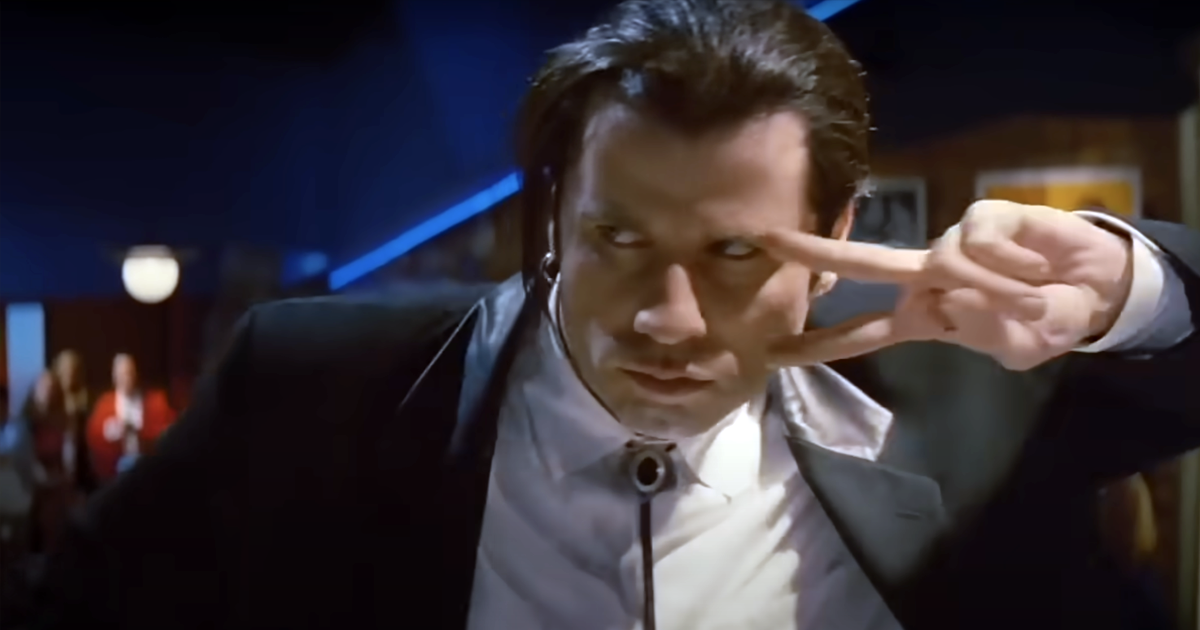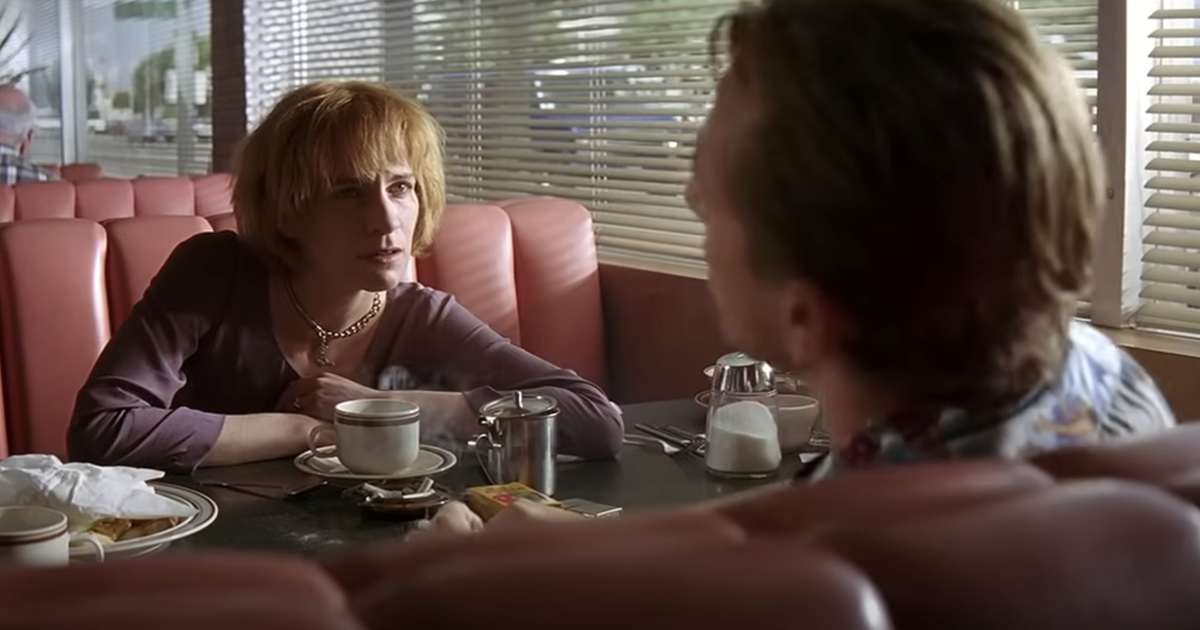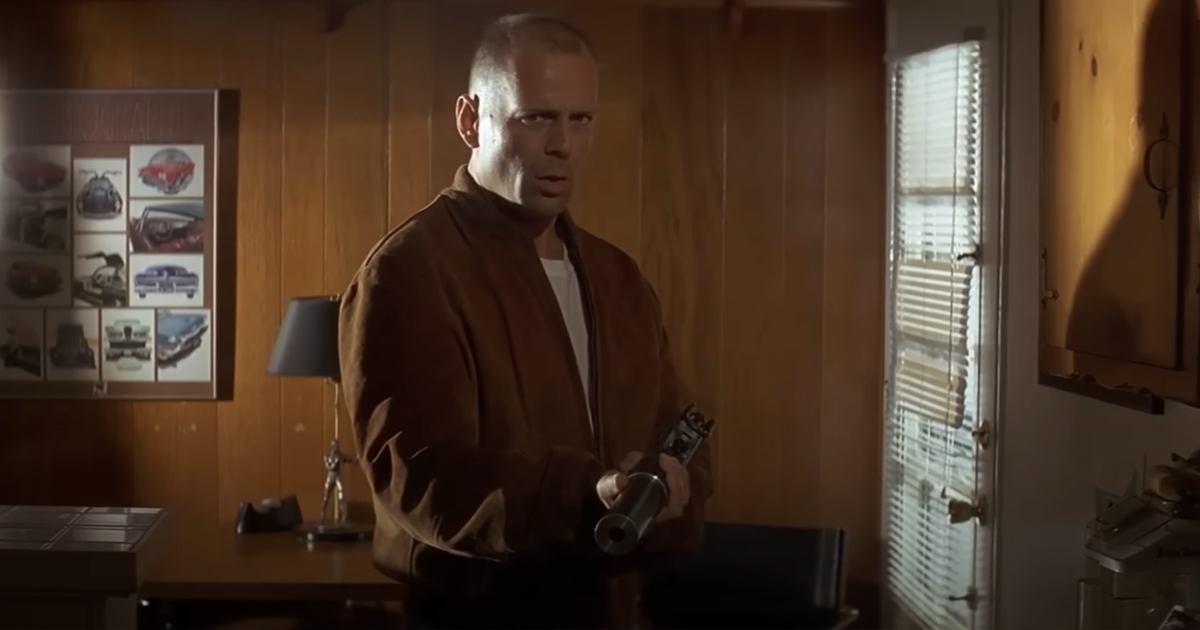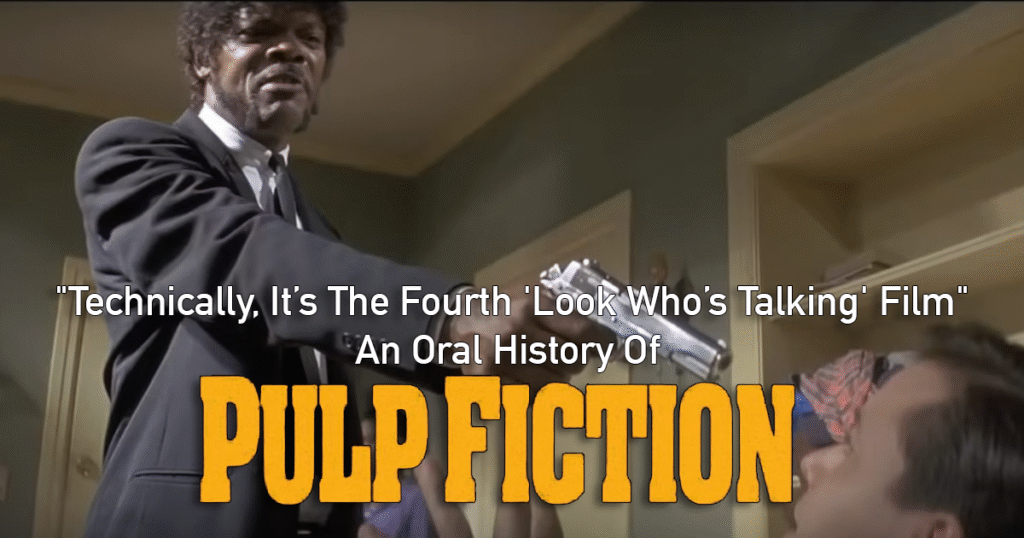Helmed by a young auteur whose only education in filmmaking was a steady diet of VHS tapes from the video rental store where he worked as a clerk, Pulp Fiction remains one of the most influential and successful independent films of all time. But while it’s now considered a classic, the stars had to align just right in order for a relative newcomer to Hollywood to make a film that launched actors into stardom, resurrected the career of a screen legend, and cemented the reputation of its director as a genius. This is the oral history of Pulp Fiction.
Quentin Tarantino (writer/director): I had just made Reservoir Dogs, which was the first movie in history where guys in suits had guns. And let me, Quentin Tarantino, tell you: People kept asking me, “Are you going to give suit guys guns again?” I would be at the zoo, and people would ask me that. I’d be in the enclosures, teaching the animals how to act like me, and these people would yell out, “Mr. Tarantino! When can we expect suited men to be armed with guns and shooting other men again?” And I would yell back, “Calm down! I am with the kangaroos now!”
Danny DeVito (producer): Quentin was banned from every zoo in the greater Los Angeles area. He’d just had a big success with Reservoir Dogs, the movie where people have guns as well as neckties. All that fame had gone to his head. Have you ever seen those machines at the zoo that create a wax gorilla out of a mold after you put a few quarters in? Well, those machines were all out of wax, because Quentin was blowing all of his Reservoir Dogs money on them. He took the $50,000 check he’d earned for Reservoir Dogs and had it cashed into quarters. Even though the machines were out of wax, he’d keep putting his quarters in there. I guess he was just happy to get a little gorilla made out of air. He was just like that at that time.
Quentin Tarantino: Well, let’s just say I was running low on cash and eating a diet made up exclusively of wax gorillas. There were air gorillas scattered all over the floor of my studio apartment. It wasn’t a high point in my life. Lotta kangaroo bites/gashes. I needed another movie, and the only movies I liked were the Look Who’s Talking films—the films where babies talk. Really interesting stuff. So, of course, I’m thinking I’ll just whip up a sequel called, Look Who’s Still Talking, and it’ll be about those babies, only now they’re all grown up, but they’re still talking.
John Travolta (Vincent Vega): I was brought on board because originally it was meant to be a sequel to Look Who’s Talking, which I’d starred in. Quentin called my agent and explained his idea that those babies were now all grown up, and my agent was like, ‘What do you mean? So it’s just a movie about adults who can talk?’ Then Quentin paused on the phone for a good 15 minutes before he finally said, “Yeppers!” in the most arrogant, narcissistic, proud-of-himself voice imaginable.
Quentin Tarantino: No one understood my vision. But I get it. I was this up-and-coming guy with gorilla wax in my teeth and kangaroo shit all over my hair. If I couldn’t convince them that my vision would work, I’d have to show them. So I packed up every piece of paper that I had (six) and hopped on a plane to Amsterdam.
Roger Avary (cowriter): Quentin had always talked about visiting Amsterdam because he believed that “you can basically do whatever you want in the zoos there” and “it doesn’t take very long to do things there.” The first part is actually true, but I don’t know what the heck he meant by the second part.
Quentin Tarantino: Writing a movie can take a long time, but in Amsterdam things just don’t take as long as they do in LA. It’s like, half the time there. And that goes for everything: sleeping, driving, gestation periods, microwaving…it’s all super quick in the Netherlands. I had my six pieces of paper nearly filled with words within seven months.
Roger Avary: I still have the six pages that Quentin faxed over to me, and honestly, it’s remarkable that such a masterpiece of a film resulted from such humble beginnings. The first two pages just have the words “Look Who’s Still Talking” spelled out in bandaids, the third page is a really good drawing of a gun, the fourth page says “adult babies” underlined and circled a bunch of times, the fifth page is the entire script to Pulp Fiction written in minuscule but perfect handwriting, and the sixth page has some hand-drawn coupons for free oil changes (which DID NOT work!).
Quentin Tarantino: There are rumors that Roger actually wrote most of Pulp Fiction and that I refused to pay him his due, but that couldn’t be further from the truth. He was well compensated for his contributions with oil change coupons. Whether the coupons worked or not is really not my problem.
Danny DeVito: The script itself was kind of weird/gross, but I loved the coupons so much that I put my face on the fax machine with a look on it like, “Let’s do this!” and faxed it on over to Tarantino. He faxed me his face back with a look on it like, “Thank you, my man!” It broke my fax machine, but it was worth it.

It didn’t take long for word to get out around Hollywood that Tarantino’s new script was a masterpiece, and everyone wanted in on the action. So Tarantino set out assembling his dream crew, launching and reviving a few careers in the process.
Harvey Keitel (Winston “The Wolf”): When I initially heard Tarantino was writing a sequel to Look Who’s Talking where the babies are grown up, I was furious with him. I said it was as if he were a pile of human feces spinning around on a roulette wheel, spraying all of the innocent gamblers—who in this metaphor represent me. But after I got done reading his script, I rarely described him that way anymore. It had it all: talking babies, talking adults…I was in.
Uma Thurman (Mia Wallace): Whenever someone in Hollywood writes a movie script, it’s always big news. The second a script is finished, all of the major studios start vying to be the ones who put it out, and all of the actors and actresses start begging to be in it. It can be about anything: the history of Tums, how sales tax rates are different in different states…anything. And it always makes $200 million.
Bruce Willis (Butch Coolidge): I’d seen Reservoir Dogs and said to myself, “I’d love to work with whatever 10-year-old boy directed this.” When I discovered it was actually a fully grown man, I thought, “Even better.”
Samuel L. Jackson (Jules Winnfield): When my agent told me that an up-and-coming director named Quantor Tarantula had written a part for me in a movie about adult talking babies, I wasn’t sure I’d be right for the role. But let’s just say Quantor does a pretty nice hand-drawn oil change coupon…
Ving Rhames (Marsellus Wallace): As I read the script, I fell in love with the character of Marsellus Wallace. I knew the role was for me. But there was a part in the middle of my script that was all redacted, right after Marsellus is run over by Butch in the street. I asked Quentin what happened in that part and he sort of shyly said, “Oh that. Yeah, don’t worry about that. Nothing really happens there at all. That’s why it’s all blacked out in your script, because it doesn’t really matter. It’s like eight minutes of nothing really going on, just kind of a break from all the witty dialogue and violent action.” So I signed up.
Quentin Tarantino: We had a cast. We had a crew. We had a budget. But the producers came to me and they said, “We know you wrote this as part of the Look Who’s Talking franchise, but we think this film can stand on its own.” “What?! No it can’t,” I insisted. But then the orange juice industry offered me $45 to mention pulp in the title, so I changed it to “Pulp Fiction.” Not gonna pass up 45 big ones.

Amanda Plummer (Honey Bunny): In the opening scene, where I stand up and scream, “Any of you fucking pricks move, and I’ll execute every mother fucking last one of you!” the original line in the script was, “I used to be a talking baby, but now I’m a talking adult, and if anyone would like to hear me talk, it’s going to cost you $15!” The idea was that I would go around the diner and collect $15 from every patron who wanted to hear an ex-talking baby talking as an adult. But on the day of the shoot, Quentin made me redo the line 48 times. On the 48th take, I snapped, took out my gun, and threatened the entire cast and crew with the now-famous line. A security guard was about to shoot me, but Quentin held out his hand and said, “Wait, that’s perfect!” But the security guard didn’t hear him and still shot me and I died.
Quentin Tarantino: Sucks when people die.
Samuel L. Jackson: Tarantonio hates CGI, so he insisted that everything in the film be real. For example, in the scene where Vincent accidentally shoots Marvin in the face in the car, we actually shot that guy in the face and blew his head off. The only CGI in the film is Bruce Willis, who had to be recreated using computer graphics because he had a bit of a rash.
Quentin Tarantino: A big tough boxer with a rash? No way. Doesn’t make sense. At the time we shot the film, CGI effects were still pretty rudimentary, which is why you never see Bruce’s face move and why his arms are so far away from his body.
Sally Menke (editor): Ninety percent of our post production budget was spent on the CGI Bruce Willis. The irony was that it took so long to do all the CGI effects that Bruce’s rash had long cleared up by the time we were finished.
Bruce Willis: It wasn’t even a rash. It was just that thing where your underwear is a little too tight and it creates a small indentation in your waist.
Quentin Tarantino: Whatever it was, it wasn’t going in my film.
Samuel L. Jackson: Fans of Pulp Fiction always want to know what was in the briefcase. Well, in the original theatrical version, it was actually shown many times that it was a small version of the film’s producer, Harvey Weinstein. The cute little Harvey would wave and giggle and glow every time we cracked open the briefcase to look inside or show it to someone. But, for obvious reasons, those parts eventually had to get cut out, which is why it’s so confusing now.
Quentin Tarantino: Originally, the briefcase was going to contain $60 cash and a few gift cards, but Harvey insisted that he be in there. Should have listened to my gut on that one, but he was basically bankrolling the entire production. Oh well, shit happens.
John Travolta: I’d never played a heroin addict before, so I called a friend of mine who was a recovering addict and asked him what heroin felt like. He said to imagine getting a shot at the doctor, only instead of medicine in the shot, it was heroin.
Uma Thurman: The vomit you see on my face in the overdose scene wasn’t actually my vomit. It was Quentin’s.
Quentin Tarantino: Movie magic, baby!
Ving Rhames: Since my script had been redacted, I had no idea what Marsellus’ final scene was going to be. The day it came time to film that scene, Quentin called me aside and he said, “Look, there’s been something I’ve been meaning to talk to you about…” He couldn’t look me in the eye. He kept staring down at his feet and shifting nervously. I thought he was going to cut me from the film or something, so finally I burst out, “Just say it, Quentin!” Right after that, he bonked me on the head and I have no memory of what happened next.
Christopher Walken (Captain Koons): My entire monologue about giving Butch the watch that his father hid inside his ass in a POW camp for four years was actually just the lyrics to an obscure Beatles song called “The Best Watch in the World.” I guess that was Quentin’s little homage to the Beatles.
Paul Calderón (Paul): I always think it’s neat when a character’s name is the same as the actor who plays them. In Pulp Fiction, my name was Paul, and that is my real name as well. That’s the best part of the movie for me. Like, imagine if the guy who played The Emperor in Star Wars was named The Emperor in real life. It would make it a much better movie.
Maria de Medeiros (Fabienne): Originally, my character’s lines about how she wants a pot belly were about wanting a cow’s belly, with the udders and everything. There’s a whole scene in the original script where she goes to a farm and tries to make it happen, and the farmer explains to her that giving her a cow’s belly would be impossible, and then God comes down from Heaven and says that technically nothing is impossible with faith but He’s not willing to help because he thinks my character looks beautiful just the way she is, and then the farmer steals God’s belt when God isn’t looking, and he puts the belt on one of his cows, and the cow becomes immortal. But we decided not to shoot it because it seemed like too much work.
Quentin Tarantino: If a scene in the script seems like it’s going to be a lot of work to shoot, I’ll usually scrap it. Like, if there’s a lot of dialogue to memorize or a complicated stunt or too many people or whatever, I’ll just say, “Forget it.” Who wants to deal with all that?

While it was met with mixed success on the festival and awards circuits, Pulp Fiction was an undeniable cultural phenomenon. Raking in serious cash at the box office and redefining what independent movies were capable of, it set the stage for the future of indie film.
Quentin Tarantino: I remember at one early screening, a man passed out during the overdose scene when they hit Mia with the big needle. Everyone was panicking and calling for a doctor, but I just casually took out my oversized adrenaline syringe and plunged it into his heart. He bolted upright, but then when he saw the big needle sticking out of his chest, he immediately passed out again. I guess it was a mistake to revive him by doing the exact same thing that had made him pass out in the first place. It took another 10 syringes to his heart before he was desensitized to it enough that he was able to stop passing out and finish watching the movie.
John Travolta: They were showing Pulp Fiction everywhere: movie theaters…uh…um…well, I guess it was mostly movie theaters. But people really liked it.
Danny DeVito: People were buying tickets for it and then using the tickets to gain entry into the theater to watch the film. It was incredible.
Samuel L. Jackson: I remember the film was so popular that the New York Times had to run a full-sized ad for itself because so many people were watching Pulp Fiction instead of reading the New York Times.
Uma Thurman: In the ‘90s, you couldn’t walk into a video rental store without seeing Pulp Fiction’s influence on the shelves. Dark, edgy crime capers like The Assassin’s Robust but Complicated Sexuality, Necktie that Doubles as a Gun, 500 Hitmen Trying to Kill the Same Guy at the Same Time but They Keep Getting in Each Other’s Way, Bloodstained Porridge, The Romantic Gunshot, Keith the Dancing Shotgun, $5,000 Worth of Stab Wounds, and Where No One Knows What Screaming Means were everywhere.
Leonard Maltin (film critic): Sin Tiempos Violentos no habría Pistola hecha de calabaza. No habría Decapitado por un panqueque afilado. No habría Charco de sangre que puede caminar y nadar. Probablemente no habría armas en las películas.
Harvey Keitel: People say that Quentin is influenced by classic exploitation and B-films, but the reality is that Pulp Fiction is so influential, such a tour de force of a film, that it actually went back in time and influenced those films. Which is very hard to do.
Uma Thurman: It’s crazy to think that in Pulp Fiction, a $5 milkshake was expensive. Now, that’s a pretty normal price for a milkshake. Inflation is a fucking bitch, man.
Quentin Tarantino: Movies aren’t that big of a deal to me. Ultimately, they’re just a thing you sit there and watch. Sometimes they’re cool, sometimes they’re not, but either way, they’re just never that big of a deal. You go to the theater, you get some popcorn (which is just an okay food), you buy a drink (which, honestly, you can get anywhere), and you look at the same thing for two hours and the thing moves around and makes some sounds. Is it an experience? Sure. But is it a great experience? Objectively, no. Running a marathon is a great experience. Giving birth is a great experience. Hunting wild game. Helping a stranger. Making a new friend. A movie is just a pretend thing that happens to pretend people who you don’t even know. Sometimes movies have cool violence and sometimes they have cool swearing, but that’s about it. Is Pulp Fiction my masterpiece? When it comes to the films I’ve made, sure. But when it comes to all of the things I’ve done in life—swimming in a cold lake in the dark, kissing the woman I love under the stars, making silent eye contact with a bear on the edge of a remote creek, hearing my son say, “Daddy,” for the first time—Pulp Fiction is a distant 78th. Are movies my life? Hardly. Movies are just a thing that you can watch when it’s time for bed.
Ving Rhames: Quentin still hasn’t let me see the film. He’ll always have some excuse, like, “Oh, it’s too dark to watch a movie right now,” or, “I think it’ll make more sense in 50 years, no need to watch it yet,” or, “It’s kind of expensive to rent it on streaming, wait until it’s free.” Can someone—please, anyone—tell me what happens? What happens to Marsellus? It’s nothing bad, is it?
John Travolta: If it weren’t for having to keep the shameful secret that we forced numerous disabled children to work on it, many of whom were killed in accidents during the production, I’d say that Pulp Fiction was the highlight of my career.

